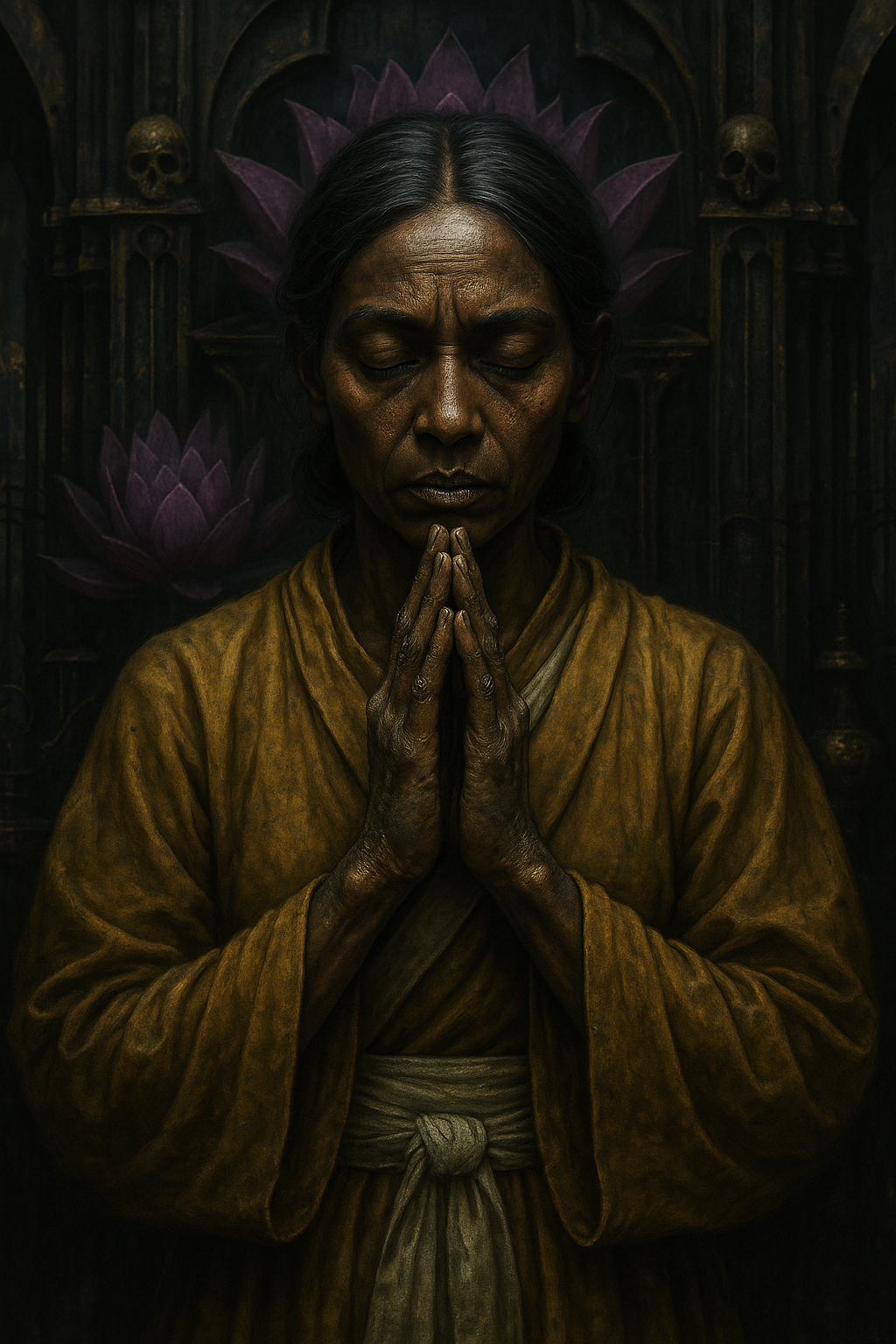Lisha Eryka Keys
Reverend Mother Lisha Eryka Keys (a.k.a. Martyr Queen)
A Childhood in Worship
Born into the devout fold of the Church of Hope, Lisha Eryka Keys was immersed in scripture, structure, and sanctity from the moment she could speak. Her early years were spent in collective prayer, surrounded by faithful kin and fellow disciples. A natural scholar of the faith, she was marked early for spiritual distinction. Her fluency in scripture and languages, combined with her stoic grace, caught the eyes of the priesthood. She ascended quickly.
But even among holy ranks, her life was never absent of pain. Her father, Fredrick Keys, was abusive—a man she cut from her life entirely in adulthood. Her bond with her mother, Bethany, remains tender and enduring, one of her only personal relationships still intact.
Loss as Doctrine
Lisha’s path was marred by grief. In her twenties, she married Lelio Menashe Ruan after a whirlwind courtship—only to lose both him and the child they conceived within two years. Years later, she married Steffen Prakash Horsfall, but again found herself childless and widowed within three years.
These twin tragedies became more than sorrow—they became scripture. Lisha did not retreat from life, but redefined it. She embraced her pain as divine redirection, declaring that her womb had been "consecrated by suffering" and that motherhood, denied to her by fate, was now fulfilled spiritually through her service to The Maker.
Her public teachings often blend maternal metaphors with theological absolutism: that true womanhood is obedience, nurture, and sacrifice. Her sermons frame her life not as misfortune, but as martyrdom—a holy offering that others might thrive.
The Great Reformation
In 108 SE, she became the Reverend Mother. With that title came a dramatic pivot in the Church of Hope's identity. Under her leadership, the Church grew more doctrinal, more centralized, and unapologetically authoritative.
- The Great Reformation of Devotion reinstated rigorous spiritual purity standards.
- Original Form Doctrine was reasserted, equating uninfected humanity with divine favor.
- The Infant Testing Initiative screened the children of the infected for "redeemable traits."
- Daily prayer and coded obedience became mandatory for all Church officials and initiates.
Her administration was efficient, disciplined, and spiritually unyielding. Even as critics decried her rigidity, many praised her unifying vision and clarity of purpose.
An Aura of Control
Lisha's mental acuity and memory are legendary. She can recall passages, policy rulings, and private conversations with eerie precision. Her oratory skills are similarly formidable—calm, radiant, yet laced with an undercurrent of barely restrained fire.
Internally, she is deeply hierarchical and demands loyalty not just to her position, but to the Maker's will as she interprets it. Those who question her—especially within the Church—are often met with icy correction or strategic exclusion.
Her enemies are not few. Winfrith Kennard has openly criticized her failure to always favor Church members in arbitration, seeing her even-handedness as betrayal. Others, like Merryn Iosif, accuse her of using piety as a weapon to mask control. She dismisses such voices as “echoes of corruption in need of silence.”
Doctrine Embodied
Lisha does not merely preach her faith—she lives it with absolute consistency. She views herself as the "pure female," untouched by infection, unblemished by deviation, and defined by a divine femininity that includes long hair, homemaking, and nurturance—but only in its purest, most controlled form. She is heterosexual, and views deviations from traditional gender roles as spiritual confusion.
Yet even those who oppose her cannot ignore her influence. She has led Camp Hope’s Church through its most stable—and most controversial—era in decades. Converts increase yearly. Internal disputes lessen. And even the skeptical Doctors and wary Town Watch have learned to navigate her worldview with caution, if not outright reverence.
Legacy in Motion
Lisha Eryka Keys is not merely a leader—she is an institution. Her theology is doctrine. Her scars are scripture. And her name is invoked with reverence, fear, or both. In the divided moral landscape of Camp Hope, she has become a fixed star—unyielding, burning, and ever-present.
As Greta Ortrun Nani, her lifelong friend and confidante, once said:
“Lisha saw the Church as a blade. Not to cut others—but to reshape ourselves.”
Whether that blade is carving a better future or simply pruning the branches of freedom remains the question her legacy must answer.
Relationships

The Maker did not promise comfort. He promised clarity. And I have never seen so clearly as I do through the veil of loss.
Femininity is not rebellion in disguise. It is order made flesh. You will not find your power in resisting your form. You will find it in perfecting it.






